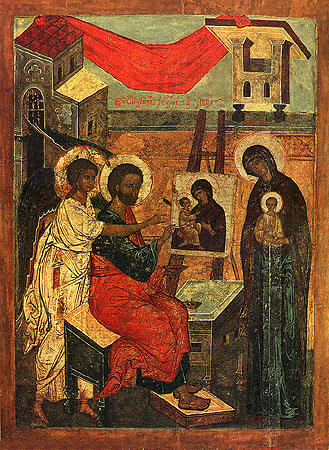The 18th October is the Feast Day of St Luke. And what a lot we should be thankful for! It might
seem blindingly obvious to say, but, we know about Jesus because people who met
him, encountered him and believed in him, wrote about him. Without their
testimony and witness, we today, would know nothing about Jesus. It makes me
feel a sense of awe and wonder – we stand in a great line of witnesses.

By Anonymous Russian icon painter (before 1917) Public domain image (according to PD-RusEmpire) - http://www.museum.ru/alb/image.asp?12822, Public Domain, https://commons.wikimedia.org/w/index.php?curid=3597619
It is often said
that St Paul created Christianity as we practice it, but St Luke is also
without comparison. St Luke wrote the Gospel that bears his name and the Acts
of the Apostles, which means he wrote 25% of the New Testament.
Now, consider
this, without St Luke we wouldn’t have Mary’s narrative and story. It is St
Luke who tells us about Mary’s feelings and her cousin Margaret’s – he writes
the story of the Annunciation and the Visitation. What of art without Luke! Above you will see an icon of St Luke painting the First Icon of the Virgin Mary. Tradition tells us that he was a painter and as he wrote the key texts of the Marian tradition the connection between him and the whole Marian tradition is established.
Imagine
Christmas without the Angel Gabriel or the shepherds in the fields. But,
without Luke we would have to. It is Luke who pens the Magnificat (Mary’s song
of praise) along with the Benedictus (Zechariah’s song of praise) and the Nunc
Dimittus (Simeon’s song of praise). These great songs of praise begin his
Gospel and the stories of the birth of John the Baptist and Jesus. Just think,
no Evensong as we know it, as those texts would not exist! No Candlemas either,
as only Luke has the story of the Presentation of Jesus in the Temple.
Think too about
some of your favourite parables in the Bible – only Luke has the Good Samaritan
and the Prodigal Son, probably the most well known and loved of Jesus’
parables. It is Luke who has the short story of Mary and Martha – the one
sitting at Jesus’ feet and the other busy in the kitchen; only Luke who tells
us about Zacchaeus the tax collector who climbs a tree to see Jesus; only Luke
who has the rich man and poor Lazarus at the gate; only Luke who tells the
story of the Road to Emmaus. The list goes on.
St Luke has been
characterised as an author who has a great concern for the outcast – for anyone
on the margins, anyone who is rejected. And certainly, through his writings we
see a master storyteller at work, weaving in women and the poor, the judged and
the forgotten, the weak and the lost. He is concerned to tell the story of the
sinner who repents and of the over-powering nature of God’s mercy and
forgiveness.
Our Gospel
passage (Luke 10:1-9) tells us how Jesus called the 70 and sent them out as labourers to work
hard and prepare the way for people to receive Jesus. They were sent with
little instruction, but with a clear and certain purpose. In the Acts of the
Apostles we see a group of Christians travelling to and fro, seeking places
where the Gospel of Jesus might be received- risking everything to carry the
message. Luke was a companion of Paul – he didn’t know Jesus himself, but one of
the early followers. St Luke is an example to all of us to live our vocations –
and most of all to be witnesses.
As a society
that has been drenched in Christianity, we may feel that this work has been
done for us. But, we cannot be in any doubt that the message of Christianity
has been rejected and ignored, witnesses are needed again. Those of us gathered
here who have received the message from the Apostles, the eye-witnesses, and
early believers are called by Jesus to be sent out again and to tell the
message.
And we do that
in an age that has mastered communication methods of all sorts, but is
desperate for a message that can actually transform lives. At Christmas time we
have a great opportunity to remind people of the Gospel stories that inspire us
to believe. We are entering into that season of opportunity here at St Andrew’s
– and God calls all of us to use that time productively to communicate the
message of Jesus Christ.
Without St Luke,
who listened to God, who worked hard for God, our lives would be so much the
poorer. Each of us must consider the work that God has called us to. Can we
collaborate with God to enrich human life? What might be our contribution?
St Andrew’s
Church – sitting as it does, ‘at the heart of things’ - is called to be the
spiritual heart of this town. We are called to tell the story, to witness to
the love of God in our lives and to share the wonderful inheritance that we
have received.
Comments
Post a Comment
Please be respectful when posting comments